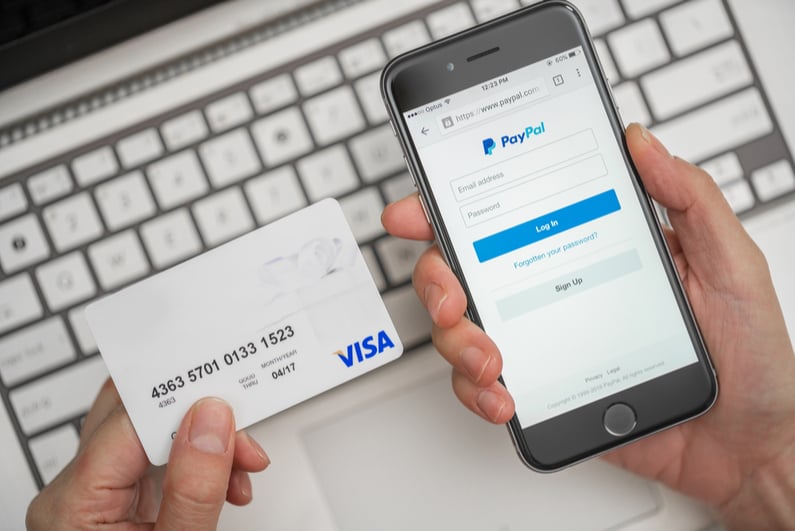30-second summary
- Delay in PayPal collecting bank payments facilitates abuse
- Gamblers spend up to £150,000 ($194,000) a day via the online payment platform
- Politicians demand a review
- PayPal has already closed the loophole in Germany
Problem gamblers have resorted to using PayPal as a means to keep gambling after reaching their spending limit on their bank debit card. The practice is possible because there is a delay between paying with PayPal and the company receiving that money from the person’s bank account.
PayPal’s loophole to exploit
It has emerged that some problem gamblers in the UK are exploiting a loophole in PayPal’s debiting system. The loophole enables them to keep betting after they have reached the spending limit on their bank debit card.
The practice is possible because you can open a PayPal using your email address and then add your bank card information. If you have no credit in your PayPal account, the platform will take the money from your bank account when you make a purchase.
However, the bank may not pay out to PayPal for 24 hours. Payment from the bank to PayPal can take even longer over a weekend: A problem gambler gambling via PayPal on a Friday night might not see the funds taken from their bank account until the following Monday.
Reports are emerging that some problem gamblers are spending as much as £150,000 ($194,000) a day. Debit cards in the UK are usually capped at between £250 ($323) and £300 ($388) a day.
Gambling experts report cases
Psychiatrist Henrietta Bowden-Jones, founder of the National Problem Gambling Clinic, has already dealt with problem gamblers running up huge debts via PayPal.
She said: “The first time I ever heard about a gambler using PayPal to pay for online gambling occurred about two weeks ago in clinic, when a young man came accompanied by one of his parents. The patient was 20 years old, with no savings.
“He had been online gambling, had reached his limit on his bank card but somehow managed to withdraw by direct debit £2,000 [$2,585] every few minutes to continue gambling while his parents were asleep next door. When they woke up the next day, he had lost £150,000.”
University researcher Stephanie Bramley, of King’s College London, reported that she was aware some students had transferred their student loans to PayPal so they could gamble without university staff being aware they had gambling problems.
Matt Zarb-Cousin, co-founder of the Gamban app, which blocks gambling websites, said he too was aware of other cases where problem gamblers had run up huge debts via PayPal.
He said: “There is a lag and that lag is what Henrietta was talking about with the 20-year-old patient. The fact he had spent money he did not have. PayPal has no limit on it with regards to gambling, so it won’t recognize previous transactions made until it’s too late.”
Authorities raise the alarm
The UK Gambling Commission, which regulates the sector, announced less than a week ago that it was launching a consultation to improve its code of practice and “make Britain’s gambling industry the fairest and safest in the world.”
It has yet to give a statement on the PayPal problem, although in March 2018 it said would be reviewing regulations for use of credit cards. However, the Department for Digital, Culture, Media, and Sport (DCMS) said the UKGC should review online payment providers as part of its consultation.
The DCMS said: “The Gambling Commission’s forthcoming call for evidence on gambling using credit cards will welcome wide-ranging submissions, in order to develop a more comprehensive understanding of associated risks.”
MPs were also critical of the loophole. The Labour Party’s deputy leader, Tom Watson, said: “[PayPal] needs to be more responsible in identifying problem behavior and stopping gamblers racking up huge debts through their service.”
PayPal’s response
PayPal today issued a statement that said: “We cannot comment on individual cases. However, we are urgently looking into these reports and take them very seriously. Our team has already reviewed the controls we have in place to identify and block problem gambling, and changes have been made to tighten the rules that govern these payments.”
However, PayPal’s somewhat bland response belies the fact that the gambling operators themselves have already taken steps elsewhere to stop gamblers exploiting the online payment provider’s loophole.
In December 2018, GVC, which is based in the Isle of Man, announced that it was removing the option to use PayPal in online casinos in Germany. It immediately blocked the facility on all its German casino platforms.
Germany is the biggest territorial market for GVC, which owns the Ladbrokes, Coral, and Sportingbet brands, among many others. The company is thought to have made the move because Germany has been trying to unify its myriad gambling regulations for a decade. They currently do not conform to EU rules on free trade.
Currently, 16 EU member states provide regulations that force online payment providers such as PayPal to block payments to unlicensed gambling operators, but only seven enforce them. Regulators in those countries have had limited success to date, partly because unlicensed operators frequently use offshore bank accounts to accept payments, outside the jurisdiction where the customers reside.




